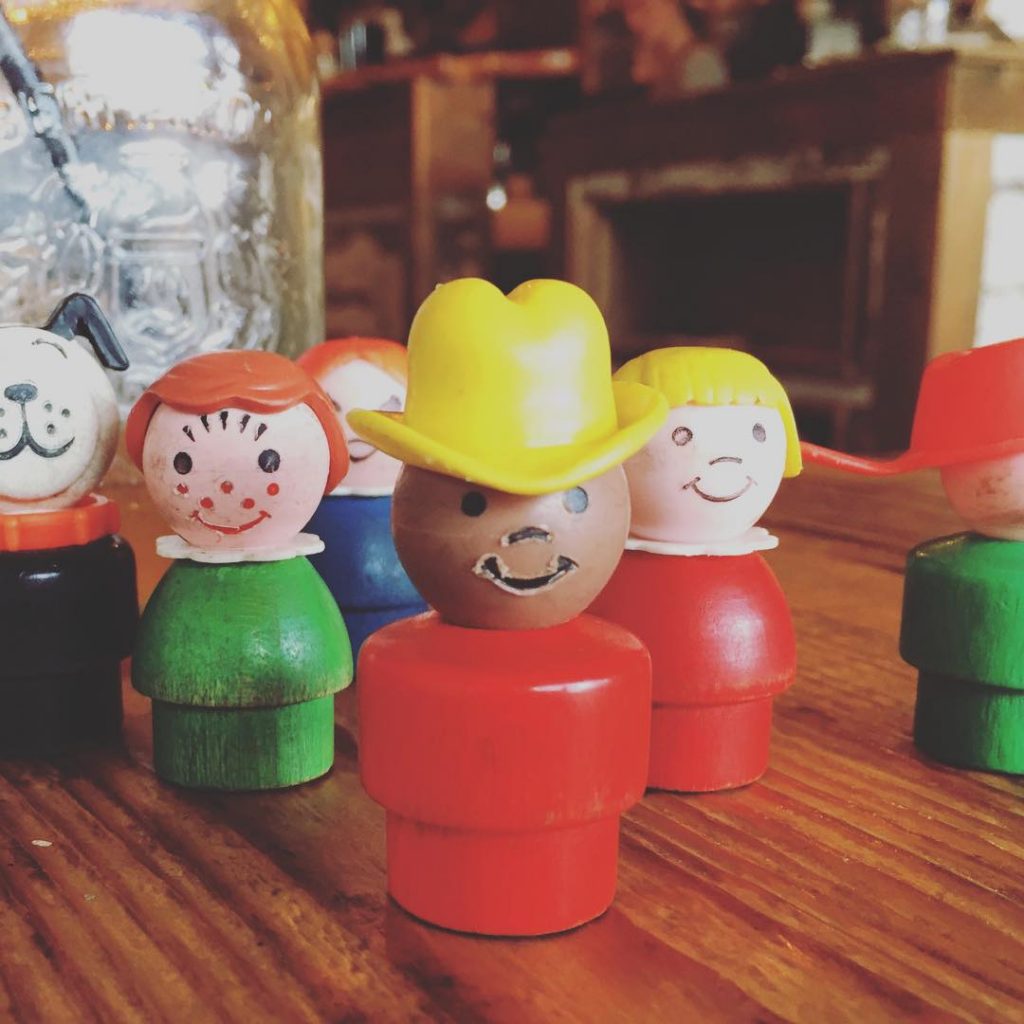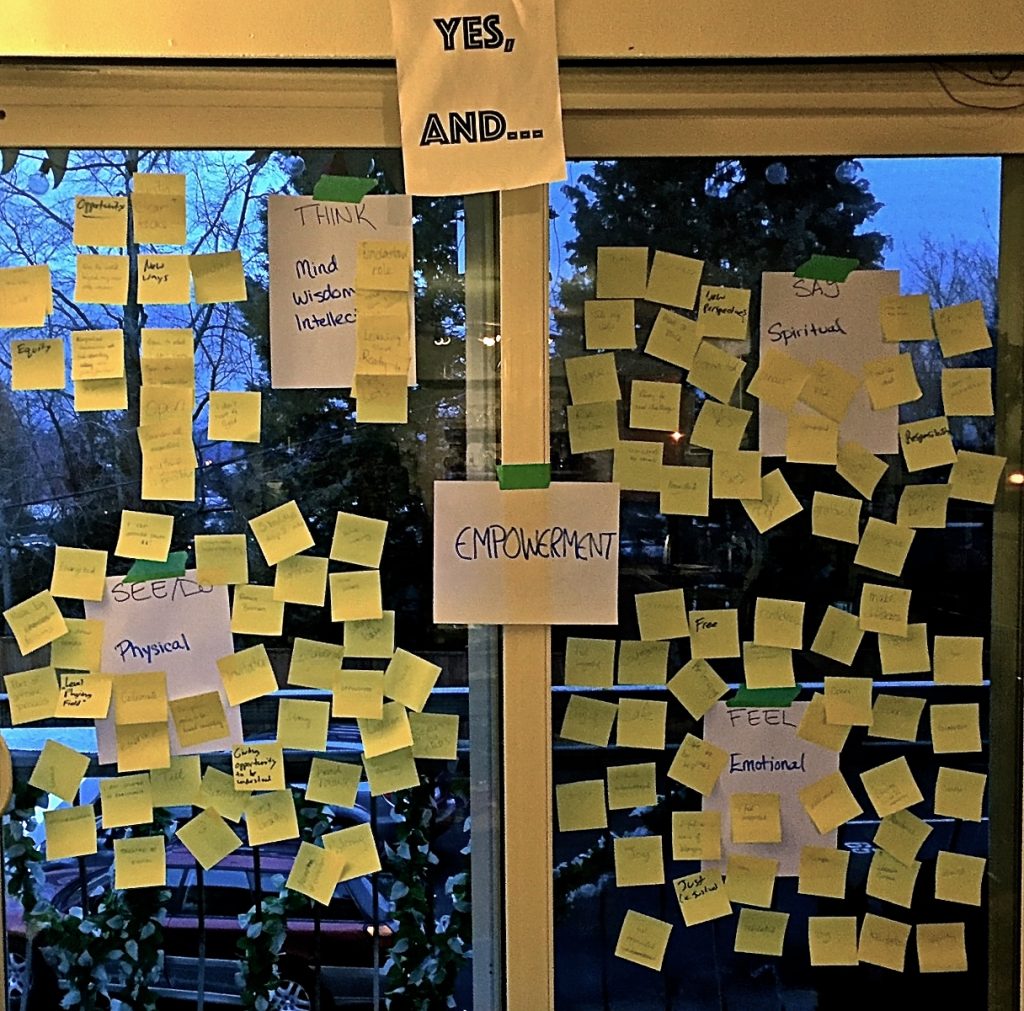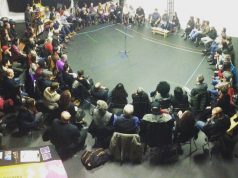
I think if we’re honest, we all consider diversity through a lens of “gain” and “loss”. How those might potentially be inverted depends on which side of privilege you habitually occupy. For those of us having these conversations on a regular basis, we are more than ready to see a collective shift in terms of what we are doing after all this talk. I’ve been reconsidering how we might activate a more expansive understanding of words like “diversity,” “inclusion,” “exclusion,” “accountability” if we created communally derived protocols[1] to guide the way.
One possible answer I offer: a Potluck Protocol Agreement.
All companies/producing collectives are invited to sign a protocol agreement that outlines a manageable and measurable list of values and actions – best practices, if you will. Signatories will commit to fulfilling this agreement throughout the 2017 season.
“But how,” you ask? How about collectively.
The Potluck Protocols will be collectively built through smaller meeting-potlucks as represented by the various ‘communities’ in Vancouver. Individuals will break bread together, dismantling what ‘we’ve always done’ into protocols that best meet the needs of their member-community.
Companies, collectives, and individuals, especially those with aspirations to foster diversity and inclusivity, would be responsible to make themselves present at some point in the process. Further mechanisms can be collectively designed to compile, propose, and fine-tune the Potluck Protocols. Venued-companies will offer their spaces for potluck-meetings as a goodwill gesture towards accessibility.
The as-a-whole theatre community will gather at the end of the 2017 season for a full day or two. Artistic directors/collective representatives will present their findings: the gains and losses of an enlivened diverse theatre practice. Based on these findings, adjustments to the Protocols will be made by those in attendance/proxied.
The benefit to meeting yearly is the ability to be responsive. It means we try, (dammit, Jim). And from our attempts, we learn. This diminishes the weighted fear of failing; it relieves companies from the pressure of needing to have the perfect solution and doing it all right the first time. As Andrea Loewen, Board President of the Jessie Richardson Awards Society said, “We won’t know what works until we try things out, after all.”
Each company/ collective will be given the opportunity to decline further involvement with the Potluck Protocol Agreement or commit to another year. This ensures some meaningful degree of transparency for the community at large.
Why potluck? If nothing else, we are building ‘community’ and where there is community, there is always—always—good food. Food on a table brings people together. And ceremony transcends difference.
Ultimately, I’m asking that protocols be collectively defined and in this, become a means to challenge the structures of privilege and normativity. After all, ‘diversity’ as its been enacted is often just enriching what we already do with what we can access, while ‘inclusion’ maintains a power structure of the us-versus-them: “I will include you.” Seen this way, it’s imperative that diversity and inclusion become more than a numbers game where we do things like hire more different looking people.

Dylan Robinson, Stó:lō scholar and Canada Research Chair in Indigenous Arts, gives a great example of this, framed around new protocols for listening:
“‘Xwelitem’ is the Halq’emeylem word Stó:lō people use to say ‘non-Indigenous person’ (or ‘Xwenitem’ in Squamish, Muqeuam, Tsleil-Waututh communities). As I understand it, these words came into use because, when settlers first arrived in our territory, they were starving. They were starving literally, for food, but starving also for gold. This hunger for resources has not abated with time, indeed it has only grown – a hunger for the resources of our land: the rocks, the trees, the water, the land itself. Each has been thirsted after, each has been consumed.
How are you listening right now? What are you listening for? Is your listening ‘hungry’?
How, might we define (demand) new protocols of engagement: listening, viewing, witnessing, that are not hungry and driven by the desire to consume knowledge and Indigenous content? Ways that are not starving?
The Potluck Protocols “could be a great way to bring clarity without reductionism,” says Jay Dodge of Boca del Lupo. Yet, despite these kinds of affirmations and pockets of ‘diversity discussions’ happening around town, fear continues to grow, shrouded with confusion or anger. The fear seems to lie in losing what has been gained. It also lies in never gaining what we have lost. It seems people fear practicing power, inverse to how one might be used to.
The very nature of reciprocity and protocol as I’m offering it, is not utopian; more, it is that it offers empowerment, birthed of self-determination, internalized through community-led accountability. We gain opportunity for all sides of privilege and all the diverse pockets of intersectionality to be welcomed, validated, seen and heard. Allies must also be acknowledged. As for those who say they’re allies but won’t do simple-complex things like call their peers on their theatrical privilege… the generous side of me asks: can these protocols challenge and empower them to do that more and better?
Even in this ‘age of reconciliation,’ I don’t know if we will become a community of allies; I really don’t know if we’re ready. It has always been so easy to confuse reconciliation with assimilation. I still witness how ownership and entitlement gets confused for artistic integrity and guilt for accountability. Though it frames these initial thoughts, we need something other than “loss” and “gain” to view our work. I do believe we are capable of nurturing a collective consciousness and communal awareness that very simply and clearly halts talking that isn’t doing. I believe we must offer ourselves more.
And, hivemind: go.
[1] I propose “protocol” in acknowledgement of Vancouver’s unceded Coast Salish land we practice our art upon and the existing system of governance that has sustained them from time immemorial and still guides the three nations. Each nation enacts their distinct sovereignty even as they share unifying protocols (lineage, values, principles, language, codes of conduct, acknowledgements, etc.) that also embody specific spiritual beliefs. These protocols are foundational and the reciprocal respect and enactment of these protocols ensures a measurable system of accountability.
Miigwetch – Thanks to the following for the initial Facebook (and on-going) discussion: Margo Kane, Dylan Robinson, Lucia Frangione, David Bloom, Jessica Schneider, Heidi Taylor, Nicola Harwood, Jay Dodge, Diane Roberts, Tasha Faye Evans, Crystal Verge, Carmen Aguirre, Brander Raven, Jan Derbyshire, Andrea Loewen, Mona Stillwell, Christina Wells Campbell, Lisa Voth, Daniel Martin, Ron Reed, Hilary Strang, Kevin Loring, Jeremy Waller, Susanna Uchatius, Omari Newton, Leanna Brodie, Stephen Drover, Lisa Bunting, Olivia C. Davies, Sandra Currie, Jules Koostachin, Jacob Zimmer, Adrienne Wong, David Geary, Carol Sawyer, Anitra Donald, Michele Volansky, Michael Wheeler, Marianne Anderson, Amy Baskin, Jenn Griffin, Shandra Spears Bombay, Brendan Patrick McClarty, Lib Spry, Donna Spencer.
– Edited 26/01/16 9:19 EST to include additional names to Lisa’s acknowledgements. —AW








